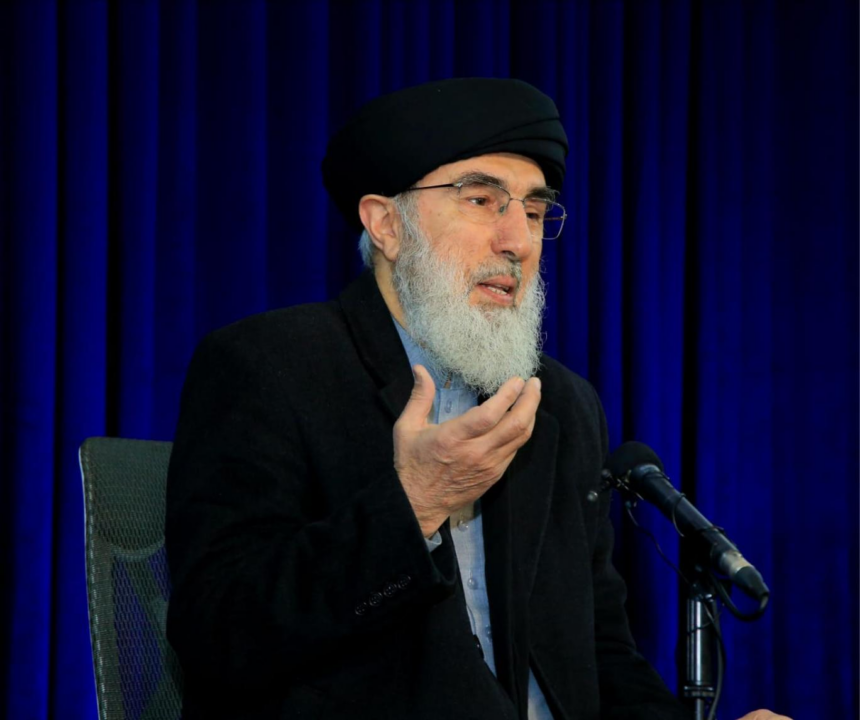RASC News Agency: Gulbuddin Hekmatyar, leader of Hizb-e-Islami Afghanistan and a long-time political actor in the country’s turbulent landscape, has suggested the existence of a clandestine strategic agreement between Washington and Moscow one that could see Ukraine quietly ceded to Russian influence in exchange for America’s return to the Afghanistani theater, potentially via the Bagram airbase and the retrieval of advanced U.S. weaponry left behind in 2021. In a newly published commentary on the social platform X, Hekmatyar contends that recent diplomatic signals from the Kremlin point to a renewed openness to dialogue with the United States regarding Afghanistan. He interprets remarks made by Russian Foreign Minister Sergei Lavrov who indicated Moscow’s willingness to revisit talks on Afghanistan as a sign that diplomatic channels severed in 2022 may soon be revived.
Hekmatyar further referenced comments made by Zamir Kabulov, Russia’s Special Envoy for Afghanistan, who downplayed the strategic value of the Bagram airbase to Moscow. Yet, Hekmatyar reads between the lines, interpreting this dismissal as a calculated signal of Moscow’s flexibility a readiness to offer limited concessions to Washington in light of shared regional concerns over the Taliban’s mismanagement of U.S.-origin military assets. The core of Hekmatyar’s argument hinges on what he describes as a shifting regional calculus: one where key powers Russia, India, Pakistan, and potentially even Iran may find it in their interest to quietly support a calibrated re-engagement of the United States in Afghanistan. This potential alignment, he claims, mirrors the coalition-building seen during the early 2000s U.S.-NATO occupation, when a shared anxiety about Afghanistan’s descent into chaos created unlikely partnerships.
Yet Hekmatyar’s analysis extends far beyond the borders of Afghanistan. He argues that American recalibrations in Ukraine may directly influence its posture in Central and South Asia. Drawing on former U.S. President Donald Trump’s transactional approach to international alliances, including his perceived indifference toward Ukrainian President Volodymyr Zelensky, Hekmatyar posits that the United States may consider withdrawing its support for Kyiv in return for a restored strategic foothold in Afghanistan. The Taliban’s deepening alliance with authoritarian regimescincluding its recent integration into China’s air corridor initiative is, in Hekmatyar’s view, catalyzing a realignment of regional powers. He asserts that India, the United States, and Iran cannot afford to remain passive observers of this shift, especially as the Taliban regime continues to cement its anti-Western orientation while suppressing fundamental freedoms, dismantling civil institutions, and turning Afghanistan into a regional proxy for Beijing’s interests.
Crucially, Hekmatyar warns that these geopolitical undercurrents may imperil key strategic infrastructure initiatives most notably the Chabahar Port project, which India and Iran have long championed as a counterbalance to China’s Belt and Road ambitions. The Taliban’s accelerating pivot toward China and its abandonment of any pretense of neutrality, he suggests, has thrown a wrench into Washington’s strategic assumptions. “The United States once believed the Taliban would hesitate to fully embrace the China-Iran axis,” Hekmatyar writes, “but the regime has shown nothing but eagerness to entrench itself within that authoritarian bloc.” This, he argues, could prompt Washington to reconsider its withdrawal doctrine and seek a new entry point perhaps via a reinvigorated Bagram presence, bolstered by tacit regional support.
In a particularly provocative assertion, Hekmatyar suggests that a future American return to Afghanistan might receive quiet backing from the same states Pakistan, India, Russia, and Iran that previously supported the 2001 invasion and occupation. According to him, these states now share an unspoken fear: that an isolated, economically imploding Taliban regime will serve as a breeding ground for extremism, destabilizing the entire region. In his concluding remarks, Hekmatyar warned that Afghanistan stands at the precipice of a profound geopolitical shift. “The threats looming over this country are no longer theoretical they are real, immediate, and potentially catastrophic,” he wrote. He urged the people of Afghanistan to learn from history, abandon factionalism, and confront emerging challenges with unity and foresight, lest they once again become pawns in a global power game.
Editorial Analysis: Hekmatyar’s stark prognosis sheds light on an increasingly alarming regional picture. While his claims remain speculative, they echo a growing sentiment among analysts: the Taliban’s ideological rigidity, diplomatic incompetence, and dependence on China and Iran have rendered Afghanistan diplomatically isolated and strategically vulnerable. Its transformation into a haven for international rivalries and its systematic repression of women, minorities, and civil society have further compounded the crisis. In the absence of legitimacy or reform, the Taliban’s rule appears unsustainable, not only for Afghanistanis but for the region at large.






